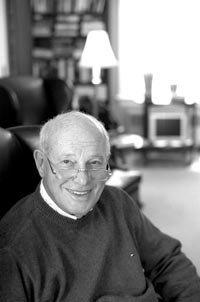NEWS- The integrator: Remembering former superintendent Tramontin

George Tramontin was at the helm when Charlottesville schools were fully integrated in 1965.
FILE PHOTO BY JEN FARIELLO
Massive Resistance, when Charlottesville closed its schools rather than integrate them in 1958, was still a fresh memory when George Tramontin took the school superintendent's job in 1963.
The wounds hadn't healed even by 1965, when Tramontin integrated city schools in a Charlottesville that wasn't as progressive as it likes to think it is now. On July 18, the man who oversaw that difficult chore died at age 84.
His daughter, Nancy Tramontin, remembers the time her parents had a party and invited some black administrators, only to find out that a number of white invitees opted not come.
And after her father was forced to resign in 1966, "He knew the corner had been turned here, so we were left with the impression that he had changed things for the better," recalls his daughter. "He felt that he had accomplished as much as he could, and he knew that others were still here trying to change things as well."
As superintendent, Tramontin had to deal with issues "case by case, child by child," says his son-in-law, state Delegate David Toscano. "It wasn't just integrating the students, but the entire school division. He was one of the folks in the front line of this."
Indeed, in a 2004 interview with the Hook, Tramontin himself recalled that even after Massive Resistance was declared unconstitutional, "Virginia dragged its feet.
"One of the biggest problems with integration back then was that you never really knew where people stood," Tramontin said. "They'd say one thing and do another."
When Charlottesville Schools hired a black speech therapist, Tramontin discovered some parents wouldn't let their children attend speech class, and the former superintendent was still amazed 40 years later. "They were willing to let their children be handicapped," he recalled. "That's how strongly they felt."
When Tramontin served as director of instruction in 1960, one of the things he deplored was people pulling their children out of public schools and starting private schools. "Now when I look back, it was a blessing," he said later. "They pulled out the most rabid ones."
After fully integrating the school division for the 1965-66 school year and closing Jefferson School, Tramontin was pressured to resign in July 1966 and left Charlottesville to teach at Harvard and head the school division North Shore, Long Island.
"Even after all the challenges, he sought to retire here," says Toscano, noting his father-in-law's 1981 return.
Tramontin's commitment to learning continued, and he served on the board of the Jefferson-Madison Regional Library from 1994 to 2002.
"The thing I remember most fondly was his sense of fairness and justice," says library director John Halliday. "I always felt justice was a guiding principle in his life. As an administrator, he was always aiming toward fairness and respect. It was the same when he was on the library board."
And Halliday adds, "He always insisted the library spend as much money on books as possible."
Nancy Tramontin describes her Michigan-born father as "highly principled," a proud grandfather and a Democrat. As her family watched the You-Tube Democratic debates July 23 after his funeral mass, "We kept thinking about how he would always talk– sometimes yell– at the television while he watched all his political shows."
The election cycle will be a little quieter this year.
#